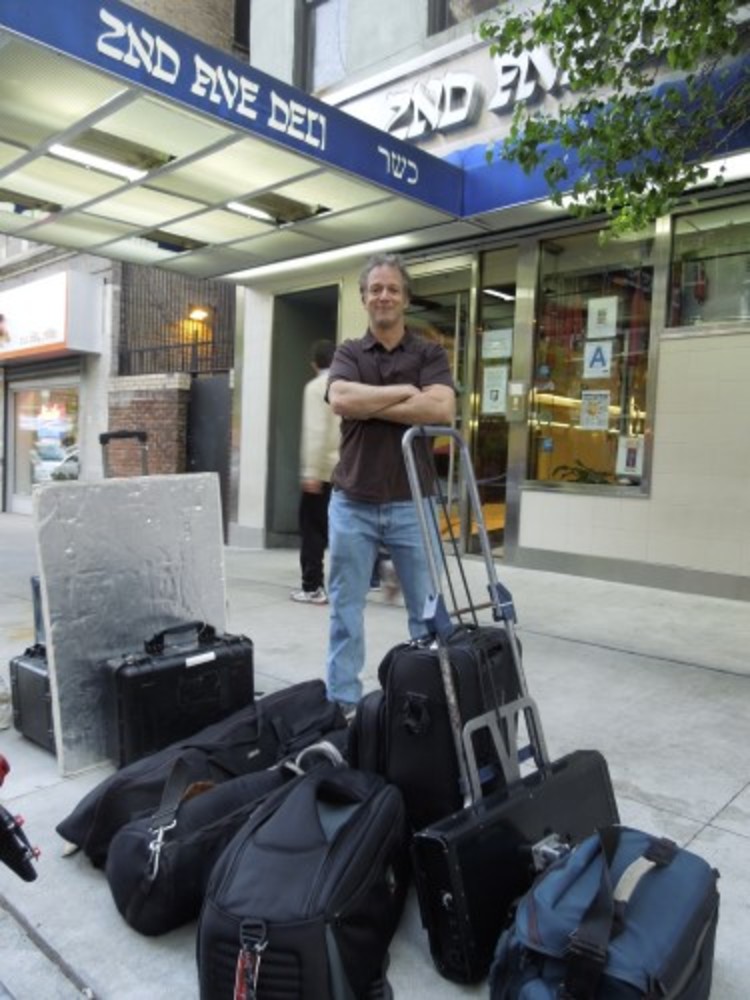‘Deli Man’ offers up a delicious taste of Jewish American history
 Erik Greenberg Anjou
Erik Greenberg Anjou
At first glance, the 2014 documentary “Deli Man” seems like an homage to pastrami. Yet the film stretches its vision far beyond the pickle, reaching back into the history of a Jewish American institution: the deli.
According to the book “Pastrami on Rye: An Overstuffed History of the Jewish Deli,” by Ted Merwin, the first Russian immigrants to New York City, in the 1880s, helped delis rise to prominence in the early 20th century.
When immigration from Europe peaked in 1907, reaching 1 million, the deli industry was booming, according to a Dec. 12, 2015, article in The Economist, “The Rise and Fall of the Jewish Deli.” By 1931, it is estimated that there were over 2,000 delis in New York City alone, says “Deli Man” director Erik Greenberg Anjou. Today, we learn from the film, there are roughly 135 Jewish delis in the entire United States.
“When you consider that number, it’s a pretty stark picture of something we think of as a pillar of Jewish cuisine and behavior,” Anjou says.
“Deli Man” describes the heyday of the delicatessen, when there was a deli on every corner, each with its own specialties, as well as the expected standards. Today, we might not even recognize items on these establishments’ lengthy, detailed menus, but Ziggy Gruber, of Kenny and Ziggy’s New York Delicatessen, the main figure profiled in the film, proudly shares binders replete with clear plastic sleeves, each containing vintage menus from New York delicatessens. Items like chollent, lungen stew and chicken fricassee have all but disappeared from the modern deli menu. Of course, knishes, matzah ball soup, overstuffed sandwiches, pickles and latkes have endured changing tastes and continue to be favorites.
“Deli Man” shows the struggle of the delicatessen to stay alive in the United States: how the rising costs of rent, equipment and quality food have translated into high menu prices that have driven away many customers. Viewers are also reminded of how the tradition of the deli is woven into the fabric of the Jewish community as a relaxed space to get together, enjoy the foods our grandparents ate, and perhaps speak and hear more Yiddish than anywhere else in the American Diaspora.
Jay Parker, owner of Ben’s Best Kosher Delicatessen, in Rego Park, N.Y., has been featured on the Food Network’s “Diners, Drive-Ins, and Dives,” as well as in “Deli Man.” Ben’s Best has survived by consistently offering high-quality deli since 1945.
“We’ve been dealing with the same vendors almost since the place opened,” Ben’s Best website states. “Ask me what I paid for corned beef yesterday, I won’t know. The price isn’t important, it’s the quality.”
Like Anjou, Parker is deeply concerned about the survival of the deli. While Parker has been on several panels delving into the institution of the American deli, he says Ziggy Gruber is the industry’s true ambassador.
Something about Gruber is unique. Young by many deli-man standards, both the film and his restaurant’s website tell how the 40-something Gruber made a study of his grandparents’ deli, the Cresthill Kosher Deli, in Spring Valley, N.Y., after he began working there at the tender age of 8.
At 15, after the passing of his beloved grandfather, Gruber journeyed to London to acquire a formal education in classical culinary arts at the Cordon Bleu. After cooking for celebrities, heads of state and the queen of England, Gruber returned to New York, where, as he puts it, “my Uncle Seymour handed me keys to the restaurant and said, ‘It’s all yours, kid.’ ”
Today, Gruber runs the thriving Kenny and Ziggy’s New York Delicatessen, in Houston. According to Anjou, in 1999, when the restaurant opened, 70 percent of Gruber’s customers were Jewish. Today, Anjou says 70 percent aren’t Jewish.
Still, the heyday of American Jewish delis appears to be behind us.
“Holocaust survivors who made it big in New York used to pull up in their limos to eat at the delis on 2nd Avenue – because it tasted like home,” Anjou said.
LEAH C. BOURAMIA is an educator, wife and the mother of two rambunctious boys. She lives in Warwick.







